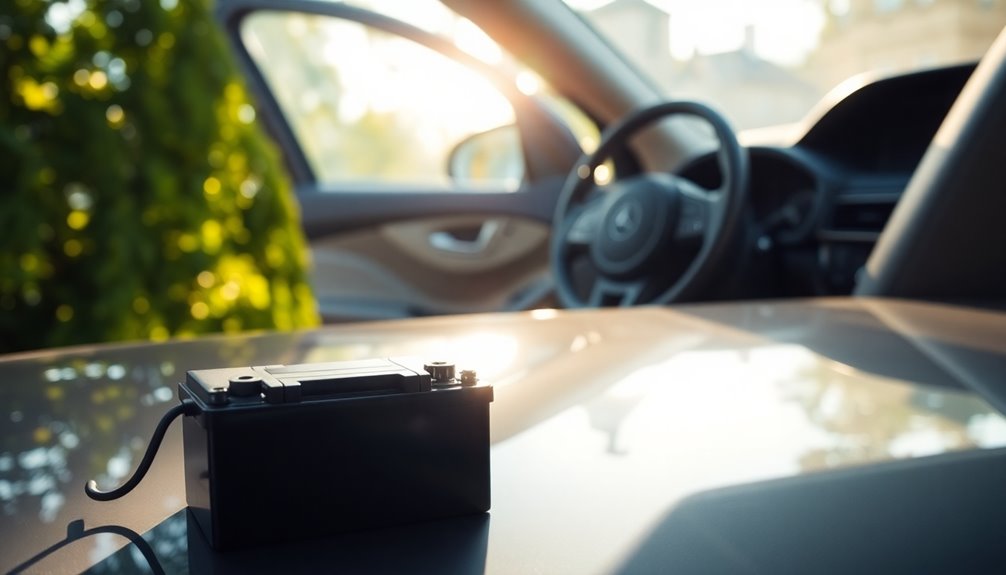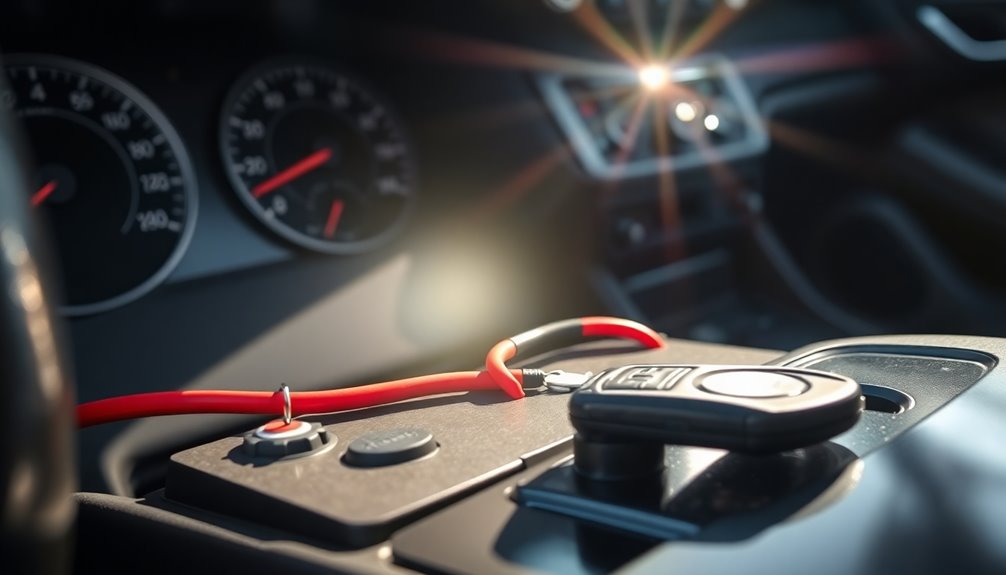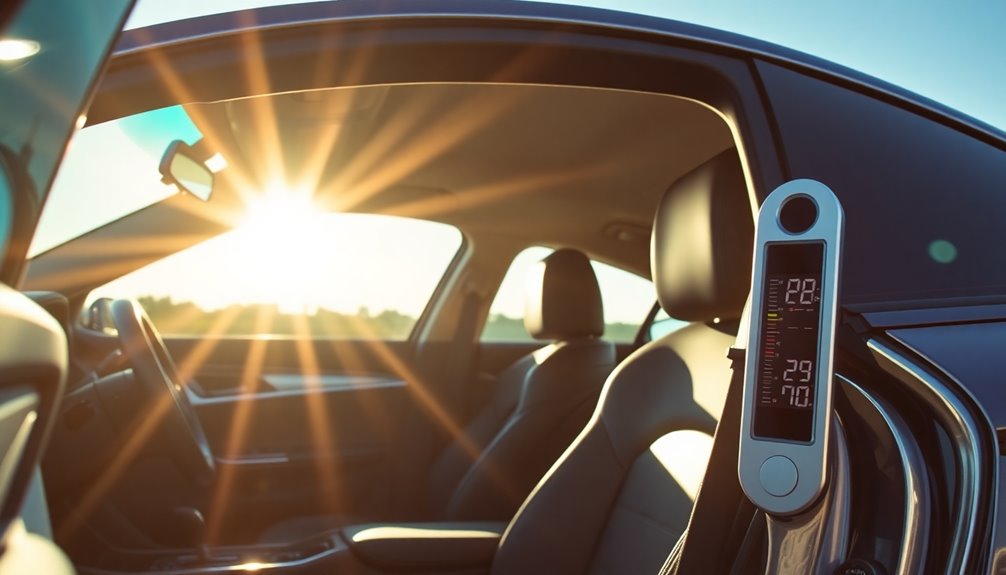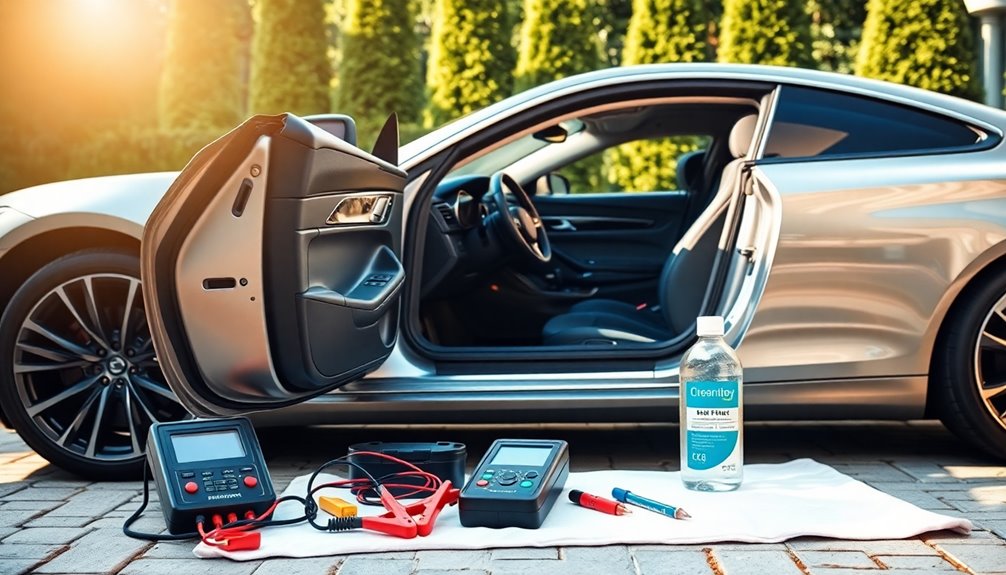Yes, leaving your car door open can drain your battery faster than you think. The interior lights and any active electronics draw power when the door's open, which can lead to significant battery drain, especially if left unattended for long periods. It's not an instant death sentence for your battery, but over time, it can affect its health. To protect your battery, always turn off any electronic devices and lights before shutting the door. Regular maintenance can also help keep your battery in optimal condition. Want to know more tips on safeguarding your battery? There's plenty to explore!
Key Takeaways
- Leaving a car door open activates the interior lights, which can drain the battery, especially over extended periods.
- The rate of battery drain depends on the electrical load; some systems draw more power than others.
- Regularly check battery voltage; a healthy battery should read around 12.6 volts to prevent unexpected failures.
- Turn off all accessories and lights before exiting the vehicle to minimize parasitic draws on the battery.
- Maintaining your battery's health through regular inspections can help prevent issues caused by leaving doors open.
Factors Affecting Battery Drain

When you leave your car door open, several factors can influence how quickly your battery drains. The size and type of your battery play a crucial role; larger batteries generally last longer than smaller ones. Additionally, newer battery technologies might resist minor electrical loads better than older ones.
Keep in mind that a fully charged battery will last longer than a partially charged one.
The primary electrical loads come from your interior and door lights. The number and type of lights activated can significantly affect battery drain. Other systems, like alarms and sensors, may also consume power. If your vehicle has an automatic shut-off feature, it can help conserve battery life by turning off lights after a period.
Environmental factors matter too. If your engine's running, the alternator recharges the battery, reducing drain. However, extreme temperatures can impact performance. Furthermore, a malfunctioning alternator may fail to effectively recharge the battery while driving, exacerbating the drain issue.
Frequent door openings can accumulate battery drain over time, and driving habits like short trips contribute to overall battery health.
Finally, remember that leaving your key fob near the car can lead to continuous communication, further draining your battery.
Impact of Electrical Loads

Leaving your car door open not only drains your battery but also highlights the impact of electrical loads on battery performance. When you turn on accessories like lights or the blower, the alternator responds by increasing its output to maintain voltage. However, if you push the electrical load too high, the alternator reaches its maximum capacity, which reduces the charging current sent to the battery. This can leave your battery struggling to recharge, especially if the engine doesn't ramp up RPMs to compensate.
Furthermore, additional electrical load can significantly influence the efficiency of your battery charging. Parasitic draws from electrical components, even when the engine's off, can further exacerbate the problem. Acceptable levels are usually below 50 milliamps, but faulty components can push things higher, leading to frequent jump-starts and a shorter battery lifespan.
Even though your battery isn't overly sensitive to voltage, a steady range of 13.5 to 14.8 volts is ideal for charging. Be mindful that while some loads may seem like they're boosting your battery's charge, they often aren't. To maintain battery health, keep an eye on electrical loads and address any parasitic draws promptly.
Temperature Effects on Batteries

Extreme temperatures can significantly affect your car battery's performance and longevity. When temperatures drop, your battery capacity decreases. At a frigid -22°F (-30°C), for example, it can lose up to 50% of its capacity.
Conversely, higher temperatures can boost battery capacity by 10-15% at 122°F (50°C), but this isn't without consequences. Every 10°C increase can halve your battery's lifespan, meaning a battery that might last 15 years at 20°C may only last 7.5 years at 30°C. Additionally, high temperatures can lead to increased chemical activity, further impacting battery health.
Additionally, heat accelerates chemical reactions, leading to faster discharge and increased sulphation, which can cause grid failures. Cold temperatures slow sulphation but reduce your battery's power output, making it harder to start your car.
When it comes to charging, temperature plays a crucial role too. Charging voltage varies with temperature, and extreme conditions require compensating chargers to avoid damage.
Cold weather affects your battery's ability to accept a charge, while high temperatures can lead to overcharging. To keep your battery healthy, be mindful of temperature extremes and how they impact performance and lifespan.
Essential Battery Maintenance Tips

To ensure your car battery stays in top condition, regular maintenance is key. Start by cleaning your battery using a damp cloth or a battery cleaning solution. Make sure the terminals are free from dirt and buildup to maintain performance. If you notice any corrosion, scrub the terminals with a terminal cleaner or a wire brush, and use a toothbrush dipped in baking soda and water on the clamps.
Next, manage your electrical load wisely. Always turn off all electrical components like lights and the radio before shutting off the engine. Avoid leaving headlights or electronic accessories on when the engine is off to prevent parasitic drain. This practice will help extend battery lifespan and reduce the likelihood of unexpected failures.
Securing your battery is crucial too. Ensure it's tightly fastened in the tray to guard against vibrations that could cause damage. Regularly inspect the physical condition of the battery for signs of wear.
Lastly, consider charging habits. If your vehicle will sit for a while, use a trickle charger or battery maintainer. Combine short trips into longer ones to let the alternator recharge effectively.
Usage Patterns and Their Impact

Understanding how your usage patterns affect your car battery is crucial for maintaining its health. Leaving your car doors open activates interior lights and other electrical systems, which can quickly drain the battery. Modern vehicles often keep computer systems active when doors are unlocked, contributing to unnecessary battery discharge.
If you frequently make short trips, your battery mightn't fully charge, as the alternator needs time to replenish it. Long idling periods also strain the battery, especially with today's high-energy-consuming modules.
When you use electronics like headlights, the radio, or heater fans while the engine is off, you're further pulling power from the battery. Even devices plugged into 120V outlets increase the electrical load. High temperatures can exacerbate this issue, leading to overheating and electrolyte evaporation, which can harm the battery.
It's essential to combine multiple short trips into longer ones to ensure your battery stays charged. Remember, if the engine is running with the door open, the alternator helps power the electrical systems, reducing battery strain.
Regular driving allows the alternator to recharge the battery effectively, so make sure you're mindful of your driving habits. By understanding and adjusting your usage patterns, you can significantly extend your car battery's lifespan.
Environmental Influences on Battery Life

Environmental factors play a crucial role in determining your car battery's lifespan and performance.
In hot climates, high temperatures can significantly reduce your battery's lifespan to an average of just 30 months. The heat accelerates chemical reactions and increases corrosion, which can lead to faster degradation. Regular inspections are essential to monitor your battery's health, especially in these conditions. Extended exposure to temperatures above 80°F can lead to increased performance degradation.
On the other hand, cold weather also impacts performance but more dramatically. At freezing temperatures, your battery can deliver only about 65% of its capacity, dropping to a mere 40% at 0°F. This increased energy demand from starting a cold engine or using heaters can strain your battery further.
Regardless of the climate, maintaining your battery is vital.
For hot climates, consider parking in the shade and regularly cleaning battery terminals.
In colder regions, ensure your battery is fully charged and consider using thermal wraps to enhance performance.
Protecting Your Battery From Drain

Extreme temperatures can put your car battery at risk of drain, making it vital to adopt strategies that protect it from unnecessary power loss. One crucial factor is battery size and capacity. Larger batteries can provide electricity for longer periods, so consider investing in a battery with greater reserve capacity.
Be aware of your vehicle's electrical demand, especially when the door is open. Interior lights and computer systems can quickly drain your battery. If you unlock your car or open the trunk, remember that this can draw around 50A from the battery. To prevent this, it's important to lock your doors when the vehicle is unattended.
To minimize drain, don't forget to regularly check your battery's voltage, ideally once a month. A healthy battery should read around 12.6 volts. Additionally, maintaining your battery terminals free of corrosion ensures optimal power delivery.
Driving your car often, especially if it's been idle for over a week, helps keep the battery charged. If you have a vehicle that you don't use frequently, a battery maintainer can keep it topped off.
Lastly, if your engine is running, it allows the alternator to recharge the battery, reducing drain.
Common Myths About Battery Drain

Myths surrounding car battery drain can lead to unnecessary confusion and costly mistakes for vehicle owners. One common myth is that leaving your car door open will instantly drain your battery. While it can affect the battery, various factors—like battery size and electrical demand—play a significant role. If your interior lights stay on, especially in older vehicles, you may see a faster drain. Additionally, regular monitoring of charge levels is essential to prevent unexpected battery failures. Energy-efficient systems can help reduce overall electrical demand, thereby lessening the impact on your battery.
Another misconception is that a short drive will fully recharge a dead battery. In reality, it often takes a longer drive or a dedicated charger to restore your battery's power fully.
Additionally, some believe that fully discharging a battery before recharging is beneficial; however, it can actually reduce the battery's lifespan.
It's also important to note that modern batteries don't suffer from the 'memory issue' that older types did.
Lastly, while extreme temperatures can impact battery performance, the myth that a battery will die immediately in severe weather is exaggerated.
Understanding these myths can help you manage your battery better and avoid unnecessary replacements.
Frequently Asked Questions
How Long Can a Battery Last With the Door Open?
When you leave your car door open, the battery's lifespan depends on several factors.
If your battery's large and fully charged, it can last several hours. However, if you've got an older model or a smaller battery, it might only last a couple of hours before draining.
The number of electronics and lights in your vehicle also plays a role, so keep an eye on your battery's charge to avoid surprises.
Can I Jump-Start My Car if the Battery Is Dead?
Yes, you can jump-start your car if the battery's dead.
First, park a donor vehicle close, ensuring both ignitions are off.
Connect the jumper cables correctly: red to red, black to black, and the other black to an unpainted metal part of your car.
Start the donor vehicle, let it run for a couple of minutes, then try starting your car.
If it doesn't start, double-check your connections.
Will Leaving the Trunk Open Drain the Battery Too?
Yes, leaving the trunk open can drain your battery.
When the trunk's open, interior and trunk lights stay on, consuming power. If your vehicle's electrical systems are active, like alarms or sensors, they'll contribute to the drain too.
The size of your battery and its charge state matter as well; a smaller or partially charged battery will drain faster.
Regularly check your battery's health and consider turning off lights to conserve power.
Does Using a Phone Charger Affect Battery Drain?
Using a phone charger can impact your battery drain, especially if you're charging with the engine off.
While the alternator replenishes power when the engine's running, an old or weak battery might struggle when you're using the charger without the engine.
Larger battery capacities in your phone offer better resilience against drain, while smaller capacities can lead to quicker depletion.
Always keep an eye on your battery's health to avoid unexpected issues.
How Can I Tell if My Battery Is Weak?
To tell if your battery's weak, watch for a slow engine crank or starting issues, like a clicking sound.
Dim headlights and flickering electronics are also red flags.
Check for physical signs, like swelling or corrosion, and remember that older batteries tend to weaken over time.
If it struggles in cold weather or shows a voltage under 14V while running, it's likely time for a replacement.
Don't ignore the warning signs!
Conclusion
In conclusion, leaving your car door open can lead to battery drain, especially if electrical loads are active. Be mindful of temperature and usage patterns, as they also impact your battery's health. Regular maintenance and understanding environmental influences can help prolong its life. By dispelling common myths and taking proactive steps, you can protect your battery and avoid unexpected issues. Stay informed and keep your vehicle in top shape to ensure it's always ready when you need it!










